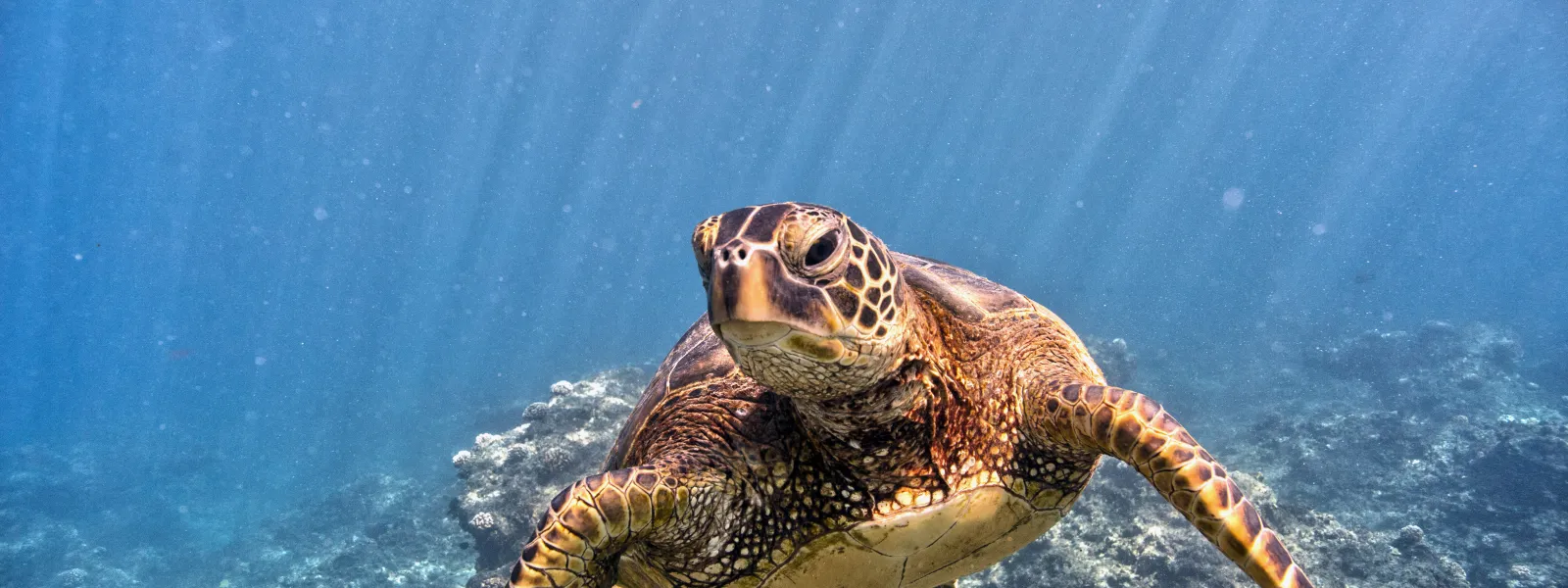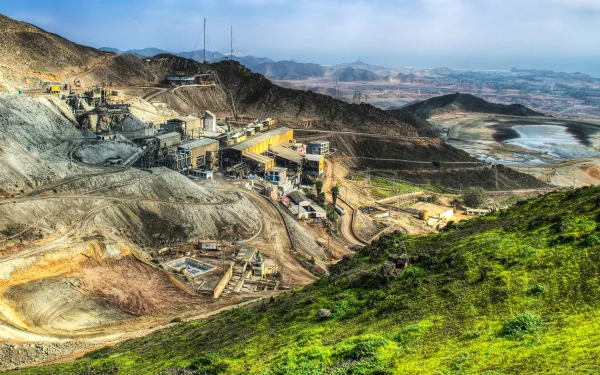
Project
Victory: Court ends the “lawful” killing of endangered green sea turtles
In February of 1999, the Constitutional Court in Costa Rica declared an end to the "lawful" killing of endangered green sea turtles. The ruling is an important victory for the green sea turtle and potentially other species left vulnerable by their host countries.
Costa Rica has the privilege and responsibility of being a haven for one of the largest remaining populations of this endangered species of marine turtle in the Atlantic Ocean. Every two or three years, female green sea turtles, many of which are decades old, slowly plod from their ocean homes to nest on a 35 kilometer long beach between the Tortuguero and Parismina River.
Costa Rica, rather than fully protecting these ancient guests, previously had a law allowing for the capture and slaughter of almost two thousand green sea turtles annually. Unfortunately, poachers exploited the law to kill many more than the legal limit, with the survival of the sea turtles jeopardized.
In response to inaction by the Costa Rican government, and to safeguard the survival of the green sea turtle, AIDA worked through its partner organization CEDARENA to file suit and challenge the law.
In the law suit, AIDA and CEDARENA argued that the law violated the Costa Rican constitutional guarantee of an environment that is healthy and “in ecological equilibrium.” We presented hard evidence of the hidden impact of the law on the sea turtles. The Court ruled in our favor, and annulled the law.
The ruling itself does not end the threat to green sea turtles. It may however, provide some breathing room for conservationists to concentrate on stopping illegal poaching. Hopefully, they will succeed.
Related projects
World Bank investment in Eco Oro Minerals in Colombia to be audited
Decision supports complainants’ arguments that the International Financial Corporation did not adequately evaluate the environmental and social impacts of company’s project in Colombia. Washington/Bogota/Ottawa. The Compliance Advisor Ombudsman (CAO), the independent complaints office of the International Financial Corporation (IFC), will carry out an audit of the IFC’s decision to purchase US$18.2 million in shares of Eco Oro Minerals (previously Greystar Resources). The Canadian company is proposing to develop the Angostura gold mine project in the high altitude wetlands – known as páramos – of Santurbán, located in the Colombian departments of Santander and North Santander. The decision comes in response to a complaint presented in June 2012 by the Committee for the Defense of Water and Páramo of Santurbán with support from the Interamerican Association for Environmental Defense (AIDA), the Center for International Environmental Law (CIEL) and MiningWatch Canada. The complainants argue that the investment did not comply with the social and environmental sustainability policies of the IFC, an arm of the World Bank Group. “We welcome the decision of the CAO to move forward with an audit. This adds to our arguments regarding the unviability of the Angostura project in Santurbán,” stated Miguel Ramos lawyer and member of the Committee for the Defense of Water and Páramo of Santurbán. “If the CAO concludes that the project fails to comply and will not comply with the standards, the IFC should sell its shares in the company.” The IFC recognized that páramo, high altitude wetlands, provide fresh water and habitat for endemic species and species in danger of extinction, such as the Andean bear and the Andean condor. They are also essential ecosystems for climate change mitigation. Colombian and international law prohibit mining in páramos. As a result, in May 2011, the Colombian Ministry of the Environment denied Eco Oro’s petition for an environmental license for the project, initially designed as an open-pit mine and now proposed as an underground operation. “Whether this project is designed as an open-pit or underground mine, we believe that it will cause irreparable damages to an ecosystem that is essential for Colombia and for the region given its high biodiversity, importance to mitigate climate change and as a source of fresh water for two million people,” said Astrid Puentes, Co-Executive Director of AIDA. “It should simply not be implemented.” The CAO’s investigation will focus on whether the evaluation of social and environmental risks was adequate, particularly considering the long-term and cumulative risks. “The IFC invested in order to stimulate the mining sector in Colombia without necessary information about potential impacts, whether of Eco Oro’s project or of the development of a mining district in the area of Santurbán, which has been affected by the armed conflict and where some 70,000 hectares have been concessioned to various companies since Eco Oro arrived,” remarked Jen Moore, Latin American Program Coordinator for MiningWatch Canada. “The decision reveals an irresponsible and unmanageable policy.” The CAO’s decision comes two weeks after it similarly decided to carry out an audit of a copper mine in Peru. In this latter case, the IFC bought shares in the project at an early phase in the project without evaluating the impacts. “From our perspective, by continuing with these sorts of investments, the IFC would fail to comply with its standards. It’s a highly worrisome trend,” concluded Kris Genovese, Senior Attorney at CIEL. The organizations that presented the complaint hope that the result of the CAO’s investigation will be comprehensive and will fundamentally question the current policy of the IFC to stimulate large scale mining through acquisition of equity holdings in exploration mining companies, known as junior firms. See a pdf version of the CAO’s report.
Read moreUN Representative on Indigenous Peoples asked to investigate human rights violations caused by Panama’s Barro Blanco dam
Washington, DC, United States. A total of 12 civil society organizations urged the United Nations (UN) Special Rapporteur on the Rights of Indigenous Peoples, James Anaya, to conduct a formal investigation into the human rights impacts of the Barro Blanco dam located on the Tabasará River in Panama. The Panamanian and international organizations also asked Mr. Anaya to call on the government of Panama to immediately halt the dam’s construction until the threats to the rights of the indigenous Ngӓbe people affected by the project have been fully addressed. The Barro Blanco controversy received special attention at the UN climate talks held last week in Bonn, Germany, because the project is registered under the Clean Development Mechanism (CDM), a carbon offsetting scheme established under the Kyoto Protocol. “The Barro Blanco dam will directly affect Ngӓbe people, yet we were not even consulted about the project before it was approved,” said Weni Bagama, an indigenous Ngӓbe leader of the Movimiento 10 de Abril, a community-based movement defending the Tabasará River from development projects. In September 2012, the UN Development Programme (UNDP) conducted a fact-finding mission at the project site and interviewed Ngäbe community members about projected impacts. UNDP’s assessment report confirmed that the dam will flood homes and religious, historical and cultural sites in the Ngӓbe-Buglé territory. The report further documented the project’s impacts, including that the dam will convert the flowing Tabasará River into a stagnant lake ecosystem, affecting the Ngäbe’s diet and means of subsistence. “Despite proof that the dam will have grave impacts on the Ngӓbe way of life and cultural heritage, the construction of the dam continues,” added Ms. Bagama. “We urge Mr. Anaya to investigate the situation and do all he can to protect the rights of the indigenous peoples affected by this project.” “The public forum where the project was discussed was held as a community meeting without a clear notification of its true objective, and there was no representation from the affected indigenous communities,” said Tania Arosemena, Legal Director of the Environmental Advocacy Center, Panama (CIAM by its Spanish initials). “The consultation process did not comply with the minimum standards demanded by national and international law on this matter.” CIAM filed a lawsuit in 2011 on behalf of members of the Ngäbe communities, who challenge the approval of the project’s environmental impact assessment. That suit is pending. Several of the organizations that wrote to Mr. Anaya also raised the Barro Blanco case at the UN climate talks in Bonn last week. “The Barro Blanco project illustrates an urgent need for reform within the CDM,” said Alyssa Johl, senior attorney at the Center for International Environmental Law (CIEL). “Once a project has been registered under the CDM, affected communities have no means to voice their concerns regarding the project’s social and environmental impacts. The UN climate regime must establish a process that allows communities to seek recourse for the harms associated with CDM projects, as well as a process to deregister projects where there are clear violations of CDM rules as in the case of Barro Blanco.” “Given the CDM’s lack of a complaint procedure and the Panamanian government’s failure to protect the Ngäbe’s rights, the communities need Mr. Anaya’s support,” said Abby Rubinson, associate attorney in Earthjustice’s International Program. “We appreciate Mr. Anaya’s past efforts to engage the Panamanian government to respond to the Ngäbe’s concerns, and we ask him to continue to play this much-needed role to prevent further violations.” The Panamanian non-governmental organizations (NGOs) that signed the letter to Mr. Anaya were CIAM, Movimiento 10 de Abril, and Asociación Ambientalista de Chiriquí. CIEL, Earthjustice, Inter-American Association for Environmental Defense (AIDA), International Rivers, Carbon Market Watch, Both ENDS, Collective Voices for Peace, Salva la Selva and Marin Interfaith Task Force on the Americas comprised the international groups that signed the letter to Mr. Anaya.
Read more
Collective Statement to the Colombian government on the collapse of Law 1382
The organizations and persons behind the Statement express our concerns to the Colombian government about the implications of the collapse of the Mining Code in effect since May 11, 2012 (Law 1382, 2010) and the consequent return to the previous Mining Code (Law 685 2001), particularly as concerns the serious consequences to the country’s environment (detailed in the document). To prevent these impacts, we urge you to take the following steps: Present in the shortest time possible a draft of the Mining Code that overcomes the deficiencies of mining regulations and brings the legislation into line with the duties of biodiversity and water protection, while previously guaranteeing that ethnic groups have the right to free, prior and informed consultation. Maintain the moratorium on mining permits until a new Mining Code is submitted and approved. Immediately decree a moratorium on environmental licenses in order to avoid the elimination of environmental protection clauses. Statement available in Spanish only.
Read more